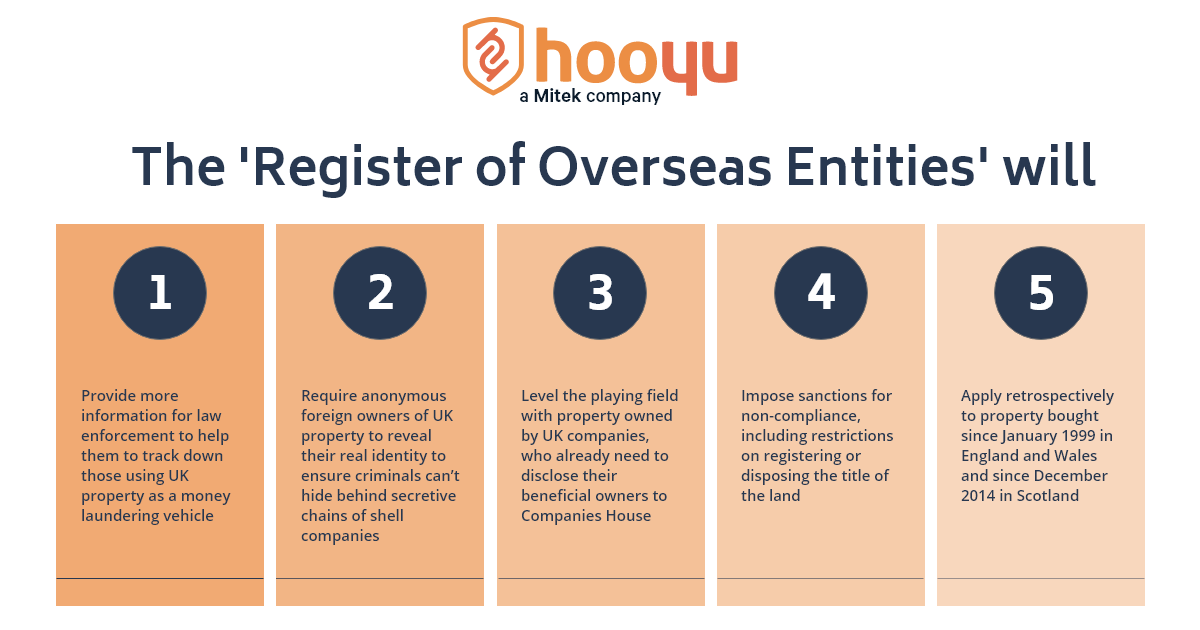It’s been a long time coming – five years, in fact, since the UK government made known its intention to create a public register detailing the overseas entities that own UK property.
Progress towards Royal Assent had been slow, but following Russia’s invasion of Ukraine, the process was fast-tracked and, on 1st August this year, the register finally became law.
Why this new law? Why now?
Although the Act was passed at speed to deal with Russia’s invasion of Ukraine – specifically, the need to sanction Russian oligarchs with financial links to the UK – the legislation was not initiated in response to the invasion. It was originally a response to Treasury Committee concerns, raised in December 2019, around the UK’s perceived ineffectiveness at tackling economic crimes.
The result was the drafting of an economic crime bill to counter fraud and money laundering in the UK. However, at the beginning of 2022, momentum was lost and progress stalled. Of course, Russia’s incursion into Ukraine completely changed the landscape and economic crime was once again back at the top of the political agenda.
What does the register mean for fraudsters… and those whose job it is to fight fraud?
Passed on March 15, the Register of Overseas Entities was a key component of the Economic Crime (Transparency and Enforcement) Act 2022 and forms part of a package of measures intended to better arm Companies House to tackle economic crime.
The register, which Companies House will hold and maintain, aims to:
- Establish clarity around the true identities of those controlling the overseas entities that own UK land
- Ensure that UK property-owning overseas entities and their beneficial owners become a matter of public record
- Act as a deterrent to those who want to launder the proceeds of crime through such ownership
In short, it seeks to ensure criminals cannot hide their identity behind complex shell company arrangements by requiring anonymous foreign companies owning or seeking to buy UK land to reveal who the assets belong to.
Importantly, the law also applies retrospectively, requiring that all overseas entities who bought property or land on or after 1 January 1999 in England and Wales, and 8 December 2014 in Scotland, must now register with Companies House and disclose who their registrable beneficial owners or managing officers are. Entities that disposed of property or land after 28 February 2022 will also need to give details of those dispositions. All those needing to register have been given a six-month transition period in which to comply, ending on 31 January 2023. Failure to comply is punishable by sanctions including restrictions on buying, selling, transferring or leasing land in the UK for those found to be at fault.

A significant step forward
The Companies House register is accessed over 10 billion times a year: it is an important foundation of the UK’s business environment.
However, recent years have seen the register manipulated.
At present, Companies House accepts filings on a ‘good-faith’ basis and the Registrar has limited scope to investigate or challenge the information presented. It’s now well-recognised that anonymous and fraudulent shell companies and partnerships set up through Companies House are being used to provide criminals with a veneer of legitimacy and, in some circumstances, aid them in committing a range of crimes, from grand corruption and money laundering to fraud and identity theft.
The Register of Overseas Entities is, therefore, a significant step forward.
But, there is still plenty of work to be done and, as always, those who will be working hard to find ways around the law.
Ray Blake and Graham Barrow, hosts of The Dark Money Files podcast, have been investigating and exposing abuse of the companies registration process for many years. We asked Ray for their reaction to the development. “I think our general tone would be one of cautious welcome. Beneficial ownership transparency is a massive disincentive to financial crime and when coupled with some level of verification, as in this new measure, helps to protect society and institutions.”
However, he cautions against seeing this as a job done. “There are exemptions in the requirements that bad guys (and good) can easily exploit to dodge this transparency and we expect to see these widely deployed. If the scale of abuse we expect manifests it will be interesting to see if there is sufficient political desire to address these loopholes through further legislation.”
Wider reform of Companies House
For those concerned with fighting fraud there is still much to be done.
As part of the Queen’s Speech in May 2022, a second economic crime bill was announced for the 2022-23 parliamentary session. Specific details of the economic crime bill 2.0 have not yet been released but the government has given some indication of the issues it seeks to address, covering the gaps left by the Economic Crime Act. A core focus is on reforms to Companies House.
This follows an announcement in the Autumn 2021 Budget, that the Government will commit £63 million to transforming every aspect of Companies House operations, aiming to “transform its digital capabilities and improve user experience to better serve the needs of a thriving 21st century economy.”
The Department for Business, Energy and Industrial Strategy (BEIS) has also published a whitepaper setting out its final proposals on the reformation of Companies House. The most significant of the reforms put forward in the BEIS whitepaper relate to:
- Identity verification and other measures relating to directors, persons with significant control (PSCs) and agents; and
- New powers for Companies House to query, reject and remove information submitted to it.
These proposals promise a fundamental shake-up of existing processes at Companies House, with identity verification a key pillar of the reforms.
We’ll be analysing the coming Economic Crime Bill 2.0 reforms in a new report – watch this space.


